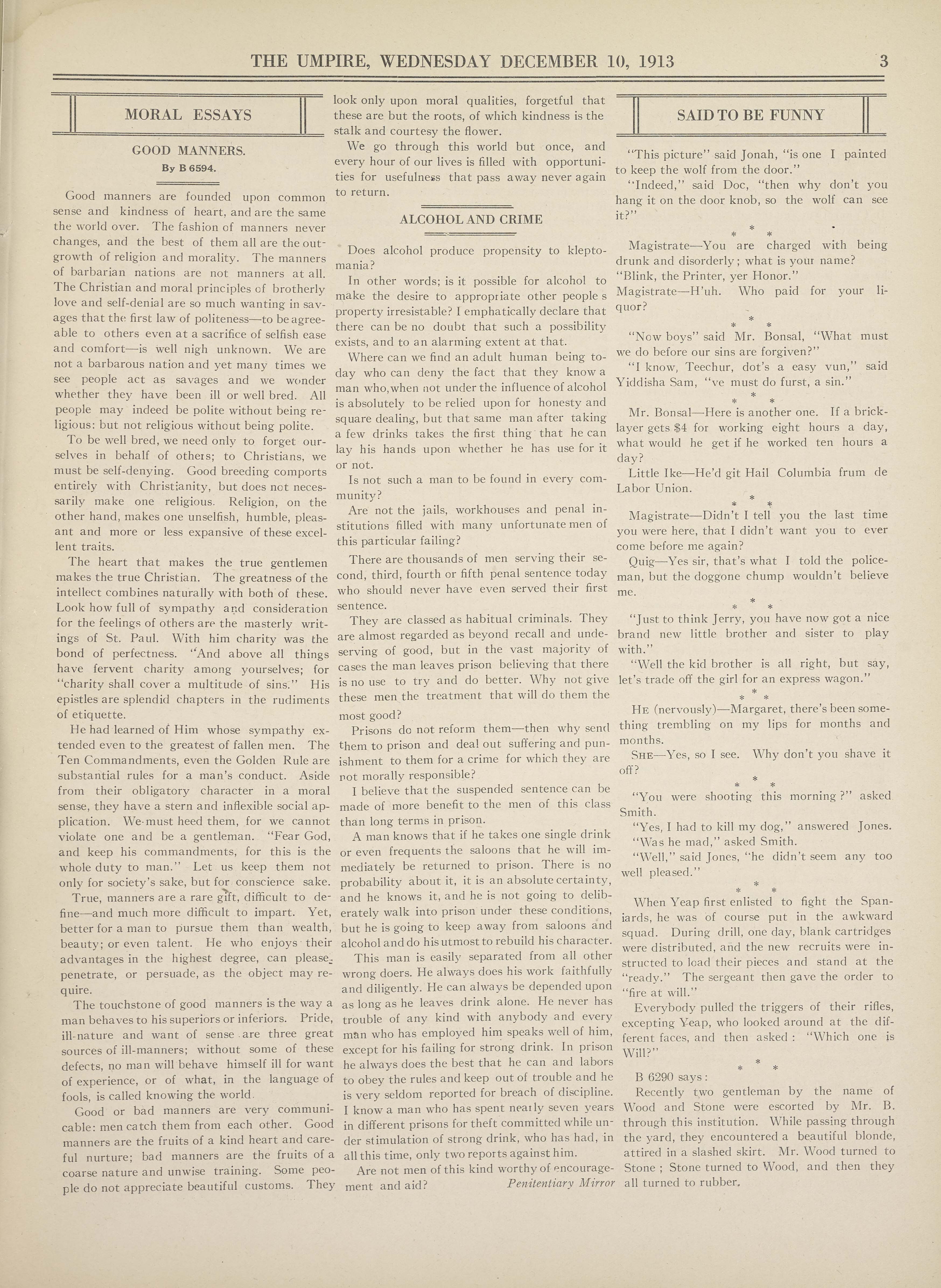Devoted to the Interests and Entertainment of its Readers
Printing in Prisons
Designed in Memory of Incarcerated Printers & Typesetters
Established 2023
Good Manners
- Author: B-6594
- Editor: B-6591
- Newspaper: The Umpire volume 2
- Page Number:
- Date: 12 10 1913
- Tags:
MORAL ESSAYS GOOD MANNERS. By B 6594. Good manners are founded upon common sense and kindness of heart, and are the same the world over. The fashion of manners never changes, and the best of them all are the outgrowth of religion and morality. The manners of barbarian nations are not manners at all. The Christian and moral principles of brotherly love and self-denial are so much wanting in savages that the first law of politeness—to be agreeable to others even at a sacrifice of selfish ease and comfort—is well-nigh unknown. We are not a barbarous nation and yet many times we see people act as savages and we wonder whether they have been ill or well bred. All people may indeed be polite without being religious: but not religious without being polite. To be well bred, we need only to forget ourselves in behalf of others; to Christians, we must be self-denying. Good breeding comports entirely with Christianity, but does not necessarily make one religious. Religion, on the other hand, makes one unselfish, humble, pleasant and more or less expansive of these excellent traits. The heart that makes the true gentlemen makes the true Christian. The greatness of the intellect combines naturally with both of these. Look how full of sympathy and consideration for the feelings of others are the masterly writings of St. Paul. With him charity was the bond of perfectness. "And above all things have fervent charity among yourselves; for "charity shall cover a multitude of sins." His epistles are splendid chapters in the rudiments of etiquette. He had learned of Him whose sympathy extended even to the greatest of fallen men. The Ten Commandments, even the Golden Rule are substantial rules for a man's conduct. Aside from their obligatory character in a moral sense, they have a stern and inflexible social application. We-must heed them, for we cannot violate one and be a gentleman. "Fear God, and keep his commandments, for this is the whole duty to man." Let us keep them not only for society's sake, but for conscience sake. True, manners are a rare gift, difficult to define—and much more difficult to impart. Yet, better for a man to pursue them than wealth, beauty; or even talent. He who enjoys: their advantages in the highest degree, can please. penetrate, or persuade, as the object may require. The touchstone of good manners is the way a man behaves to his superiors or inferiors. Pride, ill-nature and want of sense are three great sources of ill-manners; without some of these defects, no man will behave himself ill for want of experience, or of what, in the language of fools, is called knowing the world. Good or bad manners are very communicable: men catch them from each other. Good manners are the fruits of a kind heart and careful nurture; bad manners are the fruits of a coarse nature and unwise training. Some people do not appreciate beautiful customs. They look only upon moral qualities, forgetful that these are but the roots, of which kindness is the stalk and courtesy the flower. We go through this world but once, and every hour of our lives is filled with opportunities for usefulness that pass away never again to return.

